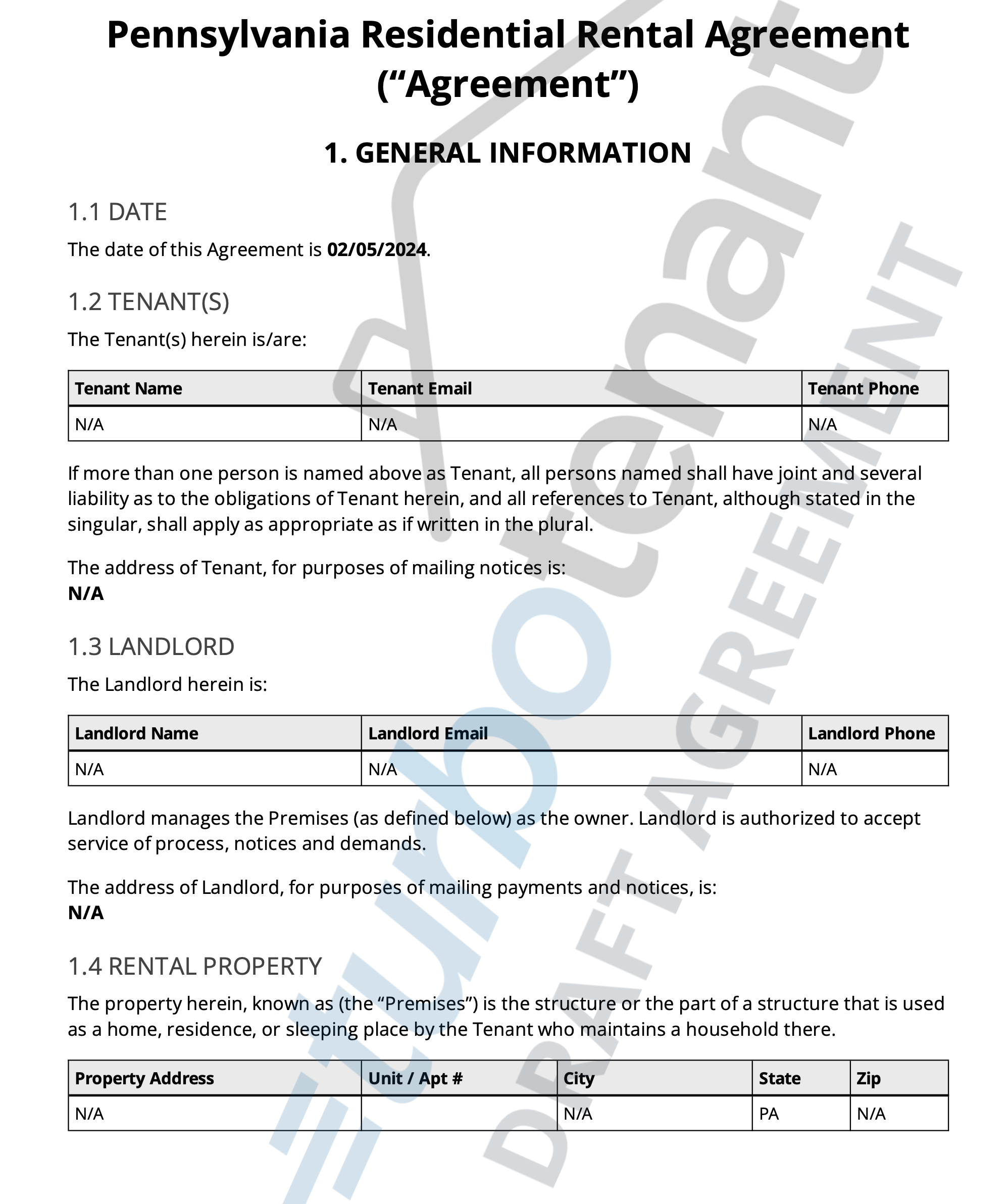
Creating a Pennsylvania lease agreement requires careful attention to both state-specific requirements and best practices for lease drafting. TurboTenant’s Pennsylvania Lease Agreement Generator and Templates streamline this process, ensuring landlords provide comprehensive, legally compliant agreements to their tenants. This article outlines the critical components of a lease agreement in Pennsylvania, including custom details, state-specific regulations, and general clauses that uphold best practices.
Section 1 – Custom to You
The first section of the lease agreement is where the landlord personalizes the document to reflect the specifics of the rental situation. Here, you’ll input details such as the parties involved in the lease, the rent amount, utility responsibilities, and any other specifics pertinent to the rental property.
Key Customization Options
- Additional Provisions: This space allows landlords to add property-specific rules or necessary local clauses. It’s recommended to review these provisions with a lawyer to ensure compliance and appropriateness.
- Lost Key Policy: Establishes the tenant’s obligation to return all keys upon moving out. Failure to do so results in the tenant being responsible for the costs associated with rekeying the property.
Section 2 – Specific to Pennsylvania
This section incorporates clauses specific to Pennsylvania to help landlords stay compliant with local laws. Important clauses include late fees, occupancy limits and guests, notification of repairs, and changing locks.
Notable Pennsylvania Regulations
- Late Fees (Section 2.1): Pennsylvania landlords can charge a late fee of 5% of the unpaid rent amount if rent is not paid by the fifth day of the month.
- Occupancy Limits and Guests (Section 2.5): The lease defines who may occupy the premise and limits guest stays to no more than 15 days every six months.
- Notification of Repairs (Section 2.7): Tenants must pay for repairs stemming from misuse or negligence and must promptly notify landlords of serious issues. Landlords are responsible for repairs necessary for a healthy and safe living environment.
- Notifying of Absences (Section 2.9): Tenants must inform landlords if they will be away from the property for more than seven days.
- Changing Locks (Section 2.12): Tenants must request in writing if they wish to change locks or security devices, with costs covered by the tenant but installation managed by the landlord.
Section 3 – General Clauses for Best Practices
Standard clauses included in most lease agreements are outlined in this section, focusing on ensuring the lease follows best practices in landlord-tenant relationships.
Key General Clauses
- Subletting (Section 3.1): Tenants are prohibited from subleasing the property without the landlord’s written permission.
- Altering or Improving the Property (Section 3.2): Tenants cannot make alterations or improvements without written consent from the landlord.
- Follow the Law (Section 3.14): Tenants must adhere to all applicable laws and ordinances and avoid being a nuisance to neighbors.

FAQ
Can I charge a late fee if rent is paid one day late in Pennsylvania?
While Pennsylvania does not have any laws setting a specific late fees or a grace period, it should be a reasonable amount and time period. Therefore, we have set our Pennsylvania lease to say a 5% late fee can be applied if rent is not received by the fifth day of the month.
How much can I collect for a security deposit in Pennsylvania?
For the first year of any lease, landlords can collect a maximum security deposit of two months’ rent. This amount is reduced to one month’s rent for the second through fourth year of renewal periods and no security deposit can be charged for a lease renewal of the fifth year and beyond. of the lease.
Do I need to pay interest on security deposits in Pennsylvania?
Starting the third year of a lease, landlords must pay the tenant interest on the security deposit annually, minus up to 1% for administrative fees.
What do I do if my tenant wants to change the locks?
If a tenant wants to change locks or add security devices, they must request it in writing. The cost is covered by the tenant, but the installation must be managed by the landlord.
TurboTenant Pennsylvania Lease Agreements
TurboTenant offers Pennsylvania landlords an efficient and reliable solution for generating lease agreements tailored to the state’s specific legal requirements. By utilizing TurboTenant’s tools, landlords can confidently create agreements that protect their interests while ensuring legal compliance and fostering positive landlord-tenant relationships. For any unique provisions or complex situations, consulting with a legal expert is advisable to ensure the lease is comprehensive and compliant with Pennsylvania law.
Pennsylvania Resources


